Solar eclipse of January 6, 2076
| Solar eclipse of January 6, 2076 | |
|---|---|
| Type of eclipse | |
| Nature | Total |
| Gamma | −0.9373 |
| Magnitude | 1.0342 |
| Maximum eclipse | |
| Duration | 109 s (1 min 49 s) |
| Coordinates | 87°12′S 173°42′W / 87.2°S 173.7°W |
| Max. width of band | 340 km (210 mi) |
| Times (UTC) | |
| Greatest eclipse | 10:07:27 |
| References | |
| Saros | 152 (16 of 70) |
| Catalog # (SE5000) | 9677 |
A total solar eclipse will occur at the Moon's descending node of orbit on Monday, January 6, 2076, with a magnitude of 1.0342. A solar eclipse occurs when the Moon passes between Earth and the Sun, thereby totally or partly obscuring the image of the Sun for a viewer on Earth. A total solar eclipse occurs when the Moon's apparent diameter is larger than the Sun's, blocking all direct sunlight, turning day into darkness. Totality occurs in a narrow path across Earth's surface, with the partial solar eclipse visible over a surrounding region thousands of kilometres wide.
This will be the first of four solar eclipses in 2076, with the others occurring on June 1, July 1, and November 26.
Related eclipses
[edit]Eclipses in 2076
[edit]- A total solar eclipse on January 6.
- A partial solar eclipse on June 1.
- A total lunar eclipse on June 17.
- A partial solar eclipse on July 1.
- A partial solar eclipse on November 26.
- A total lunar eclipse on December 10.
Metonic
[edit]- Preceded by: Solar eclipse of March 19, 2072
- Followed by: Solar eclipse of October 24, 2079
Tzolkinex
[edit]- Preceded by: Solar eclipse of November 24, 2068
- Followed by: Solar eclipse of February 16, 2083
Half-Saros
[edit]- Preceded by: Lunar eclipse of December 31, 2066
- Followed by: Lunar eclipse of January 10, 2085
Tritos
[edit]- Preceded by: Solar eclipse of February 5, 2065
- Followed by: Solar eclipse of December 6, 2086
Solar Saros 152
[edit]- Preceded by: Solar eclipse of December 26, 2057
- Followed by: Solar eclipse of January 16, 2094
Inex
[edit]- Preceded by: Solar eclipse of January 26, 2047
- Followed by: Solar eclipse of December 17, 2104
Triad
[edit]- Preceded by: Solar eclipse of March 7, 1989
- Followed by: Solar eclipse of November 6, 2162
Solar eclipses of 2073–2076
[edit]This eclipse is a member of a semester series. An eclipse in a semester series of solar eclipses repeats approximately every 177 days and 4 hours (a semester) at alternating nodes of the Moon's orbit.[1]
The partial solar eclipses on June 1, 2076 and November 26, 2076 occur in the next lunar year eclipse set.
| Solar eclipse series sets from 2073 to 2076 | ||||||
|---|---|---|---|---|---|---|
| Descending node | Ascending node | |||||
| Saros | Map | Gamma | Saros | Map | Gamma | |
| 122 | February 7, 2073 Partial |
1.1651 | 127 | August 3, 2073 Total |
−0.8763 | |
| 132 | January 27, 2074 Annular |
0.4251 | 137 | July 24, 2074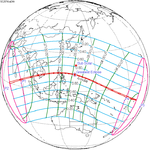 Annular |
−0.1242 | |
| 142 | January 16, 2075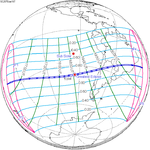 Total |
−0.2799 | 147 | July 13, 2075 Annular |
0.6583 | |
| 152 | January 6, 2076 Total |
−0.9373 | 157 | July 1, 2076 Partial |
1.4005 | |
Saros 152
[edit]This eclipse is a part of Saros series 152, repeating every 18 years, 11 days, and containing 70 events. The series started with a partial solar eclipse on July 26, 1805. It contains total eclipses from November 2, 1967 through September 14, 2490; hybrid eclipses from September 26, 2508 through October 17, 2544; and annular eclipses from October 29, 2562 through June 16, 2941. The series ends at member 70 as a partial eclipse on August 20, 3049. Its eclipses are tabulated in three columns; every third eclipse in the same column is one exeligmos apart, so they all cast shadows over approximately the same parts of the Earth.
The longest duration of totality will be produced by member 30 at 5 minutes, 16 seconds on June 9, 2328, and the longest duration of annularity will be produced by member 53 at 5 minutes, 20 seconds on February 16, 2743. All eclipses in this series occur at the Moon’s descending node of orbit.[2]
| Series members 1–22 occur between 1805 and 2200: | ||
|---|---|---|
| 1 | 2 | 3 |
 July 26, 1805 |
 August 6, 1823 |
 August 16, 1841 |
| 4 | 5 | 6 |
 August 28, 1859 |
 September 7, 1877 |
 September 18, 1895 |
| 7 | 8 | 9 |
 September 30, 1913 |
 October 11, 1931 |
 October 21, 1949 |
| 10 | 11 | 12 |
 November 2, 1967 |
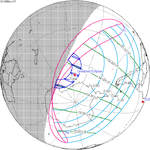 November 12, 1985 |
 November 23, 2003 |
| 13 | 14 | 15 |
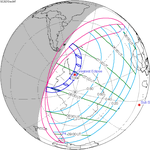 December 4, 2021 |
 December 15, 2039 |
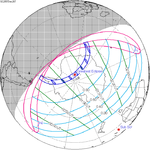 December 26, 2057 |
| 16 | 17 | 18 |
 January 6, 2076 |
 January 16, 2094 |
 January 29, 2112 |
| 19 | 20 | 21 |
 February 8, 2130 |
 February 19, 2148 |
 March 2, 2166 |
| 22 | ||
 March 12, 2184 | ||
Metonic series
[edit]The metonic series repeats eclipses every 19 years (6939.69 days), lasting about 5 cycles. Eclipses occur in nearly the same calendar date. In addition, the octon subseries repeats 1/5 of that or every 3.8 years (1387.94 days). All eclipses in this table occur at the Moon's descending node.
| 22 eclipse events between June 1, 2011 and October 24, 2098 | ||||
|---|---|---|---|---|
| May 31–June 1 | March 19–20 | January 5–6 | October 24–25 | August 12–13 |
| 118 | 120 | 122 | 124 | 126 |
 June 1, 2011 |
 March 20, 2015 |
 January 6, 2019 |
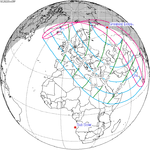 October 25, 2022 |
 August 12, 2026 |
| 128 | 130 | 132 | 134 | 136 |
 June 1, 2030 |
 March 20, 2034 |
 January 5, 2038 |
 October 25, 2041 |
 August 12, 2045 |
| 138 | 140 | 142 | 144 | 146 |
 May 31, 2049 |
 March 20, 2053 |
 January 5, 2057 |
 October 24, 2060 |
 August 12, 2064 |
| 148 | 150 | 152 | 154 | 156 |
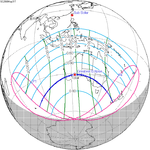 May 31, 2068 |
 March 19, 2072 |
 January 6, 2076 |
 October 24, 2079 |
 August 13, 2083 |
| 158 | 160 | 162 | 164 | |
 June 1, 2087 |
 October 24, 2098 | |||
Tritos series
[edit]This eclipse is a part of a tritos cycle, repeating at alternating nodes every 135 synodic months (≈ 3986.63 days, or 11 years minus 1 month). Their appearance and longitude are irregular due to a lack of synchronization with the anomalistic month (period of perigee), but groupings of 3 tritos cycles (≈ 33 years minus 3 months) come close (≈ 434.044 anomalistic months), so eclipses are similar in these groupings.
| Series members between 1801 and 2200 | ||||
|---|---|---|---|---|
 February 21, 1803 (Saros 127) |
 January 21, 1814 (Saros 128) |
 December 20, 1824 (Saros 129) |
 November 20, 1835 (Saros 130) |
 October 20, 1846 (Saros 131) |
 September 18, 1857 (Saros 132) |
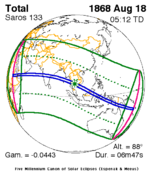 August 18, 1868 (Saros 133) |
 July 19, 1879 (Saros 134) |
 June 17, 1890 (Saros 135) |
 May 18, 1901 (Saros 136) |
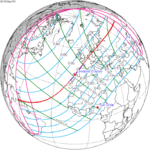 April 17, 1912 (Saros 137) |
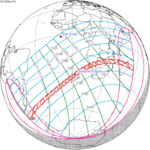 March 17, 1923 (Saros 138) |
 February 14, 1934 (Saros 139) |
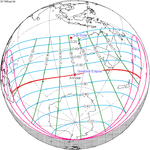 January 14, 1945 (Saros 140) |
 December 14, 1955 (Saros 141) |
 November 12, 1966 (Saros 142) |
 October 12, 1977 (Saros 143) |
 September 11, 1988 (Saros 144) |
 August 11, 1999 (Saros 145) |
 July 11, 2010 (Saros 146) |
 June 10, 2021 (Saros 147) |
 May 9, 2032 (Saros 148) |
 April 9, 2043 (Saros 149) |
 March 9, 2054 (Saros 150) |
 February 5, 2065 (Saros 151) |
 January 6, 2076 (Saros 152) |
 December 6, 2086 (Saros 153) |
 November 4, 2097 (Saros 154) |
 October 5, 2108 (Saros 155) |
 September 5, 2119 (Saros 156) |
 August 4, 2130 (Saros 157) |
 July 3, 2141 (Saros 158) |
 June 3, 2152 (Saros 159) |
 April 1, 2174 (Saros 161) | |
Inex series
[edit]This eclipse is a part of the long period inex cycle, repeating at alternating nodes, every 358 synodic months (≈ 10,571.95 days, or 29 years minus 20 days). Their appearance and longitude are irregular due to a lack of synchronization with the anomalistic month (period of perigee). However, groupings of 3 inex cycles (≈ 87 years minus 2 months) comes close (≈ 1,151.02 anomalistic months), so eclipses are similar in these groupings.
| Series members between 1801 and 2200 | ||
|---|---|---|
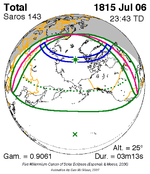 July 6, 1815 (Saros 143) |
 June 16, 1844 (Saros 144) |
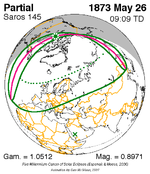 May 26, 1873 (Saros 145) |
 May 7, 1902 (Saros 146) |
 April 18, 1931 (Saros 147) |
 March 27, 1960 (Saros 148) |
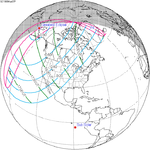 March 7, 1989 (Saros 149) |
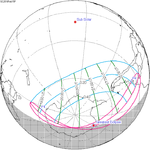 February 15, 2018 (Saros 150) |
 January 26, 2047 (Saros 151) |
 January 6, 2076 (Saros 152) |
 December 17, 2104 (Saros 153) |
 November 26, 2133 (Saros 154) |
 November 7, 2162 (Saros 155) |
 October 18, 2191 (Saros 156) |
|
Notes
[edit]- ^ van Gent, R.H. "Solar- and Lunar-Eclipse Predictions from Antiquity to the Present". A Catalogue of Eclipse Cycles. Utrecht University. Retrieved 6 October 2018.
- ^ "NASA - Catalog of Solar Eclipses of Saros 152". eclipse.gsfc.nasa.gov.
References
[edit]- Earth visibility chart and eclipse statistics Eclipse Predictions by Fred Espenak, NASA/GSFC




